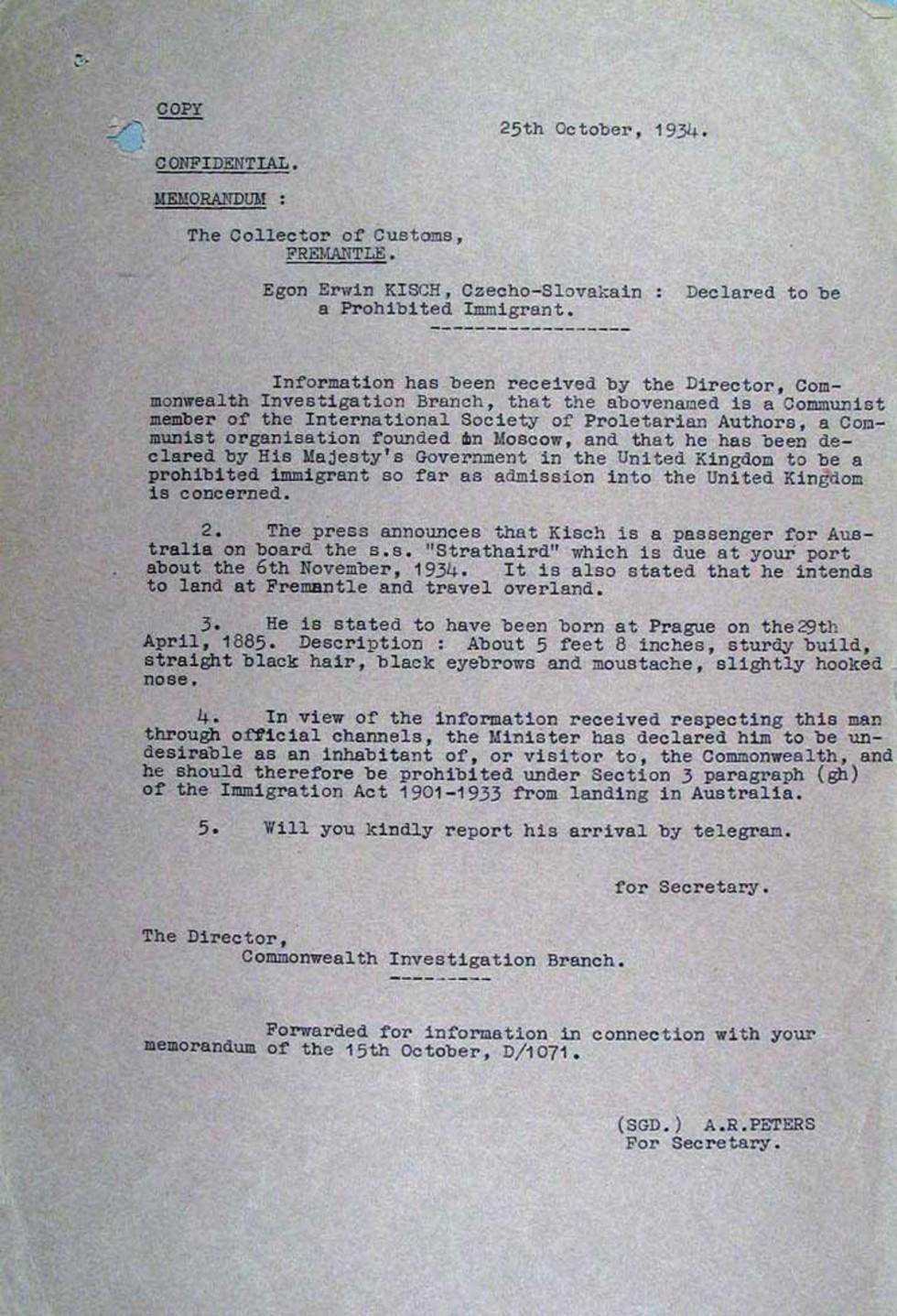


Transcript
[Underlined header:] COPY.
25th October, 1934.
CONFIDENTIAL. [underlined]
MEMORANDUM: [underlined]
The Collector of Customs,
FREMANTLE. [underlined]
[Heading:] Egon Erwin Kisch, Czecho-Slovakain: Declared to be a Prohibited Immigrant.
[dividing line]
Information has been received by the Director, Commonwealth Investigation Branch, that the abovenamed is a Communist member of the International Society of Proletarian Authors, a Communist organisation founded in Moscow, and that he has been declared by His Majesty’s Government in the United Kingdom to be a prohibited immigrant so far as admission into the United Kingdom is concerned.
2. The press announces that Kisch is a passenger for Australia on board the s.s. "Strathaird" which is due at your port about the 6th November, 1934. It is also stated that he intends to land at Fremantle and travel overland.
3. He is stated to have been born at Prague on the 29th April, 1885. Description: About 5 feet 8 inches, sturdy build, straight black hair, black eyebrows and moustache, slightly hooked nose.
4. In view of the information received respecting this man through official channels, the Minister has declared him to be undesirable as an inhabitant of, or visitor to, the Commonwealth, and he should therefore be prohibited under Section 3 paragraph (gh) of the Immigration Act 1901-1933 from landing in Australia.
5. Will you kindly report his arrival by telegram.
for Secretary.
The Director,
Commonwealth Investigation Branch.
[dividing line]
Forwarded for information in connection with your memorandum of the 15th October, D/1071.
(SGD.) A.R.PETERS
For Secretary.
About this record
This is a confidential memorandum from 1934 sent by the Director of the Commonwealth Investigation Branch alerting the Collector of Customs in Fremantle to the prospective entry of Egon Erwin Kisch into Australia. The document details Kisch's background, recent activities and personal particulars as well as his intentions to disembark at Fremantle, Western Australia. It cites the Immigration Act 1901–1933 as justification for preventing Kisch from landing in Australia.
Educational value
- This document relates to a high-profile scandal that became known as the 'Kisch Affair' in which Czechoslovakian communist, anti-war and anti-fascism activist Egon Kisch was denied entry to Australia by the Commonwealth. This developed into an embarrassing incident for the Lyons government, with subsequent wide publicity and legal action culminating in the rejection of the Commonwealth's actions by the High Court.
- Kisch was an author and public speaker who was invited to Australia by the Movement Against War and Fascism to speak at the All Australian Congress Against War in Melbourne in November 1934. The Commonwealth believed that the Congress, which coincided with the conclusion of Melbourne's month-long centenary celebrations, was a deliberate counter attraction aimed at spreading communist propaganda and undermining the celebrations.
- Although Kisch was declared a prohibited immigrant and refused permission to disembark at Fremantle, he managed to stay in Australia for four months, during which time he gave several public lectures. Kisch had made headlines by jumping ship on arrival in Melbourne. Although he had broken his leg, he was returned to the ship, which continued on to Sydney. Once there, he was allowed entry by Justice Evatt of the High Court on technical grounds and released on bail.
- In Fremantle, Kisch failed a dictation test which in accordance with Section 3 of the Immigration Restriction Act could be given to prospective immigrants in any European language. Kisch spoke several European languages but was given the test in Scottish Gaelic. The High Court overruled the Commonwealth, finding that Scottish Gaelic was not a European language under the Act. The Government agreed to remit Kisch's three month prison sentence and pay costs if he left Australia promptly. He did so on March 11.
- The attempt to exclude Kisch from Australia, using an almost unheard of application of the Immigration Restriction Act, was made in a sensitive political climate by the conservative Lyons government acting on secret advice from Special Branch in London. While the Act was initially used to exclude non-European migrants to Australia and underpinned the White Australia Policy, anxieties over the spread of communism prompted its use in this case.
- Kisch had denied, falsely, that he was a communist and so the Commonwealth's attempt to stop him entering the country was seen as an affront to free speech, particularly within the literary community. A legacy of Kisch's visit was the foundation shortly afterwards of the Australian Writers' League, which opposed fascism. The visit alerted Australians to the threat of fascism and was also seen as a publicity boost for anti-war campaigners.
Acknowledgments
Learning resource text © Education Services Australia Limited and the National Archives of Australia 2010.
Related themes
Need help with your research?
Learn how to interpret primary sources, use our collection and more.



